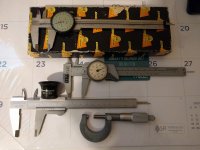I am using a cheap dial caliper and am not sure of readings because the number depends on how tightly I close the jaws. I don't know what is a correct amount of pressure.
I would like to buy a new set and while shopping I see not only a choice between digital and dial, but I read about vernier calipers and micrometers.
Which of these will help me most with my question about how tightly the jaws should be closed? Maybe they are all the same in that regard.
Also, what is the basic difference between all these; i.e. when would you want one versus a different type?
I would not want to spend more than 50-75 bucks on one. Thanks.
I would like to buy a new set and while shopping I see not only a choice between digital and dial, but I read about vernier calipers and micrometers.
Which of these will help me most with my question about how tightly the jaws should be closed? Maybe they are all the same in that regard.
Also, what is the basic difference between all these; i.e. when would you want one versus a different type?
I would not want to spend more than 50-75 bucks on one. Thanks.






